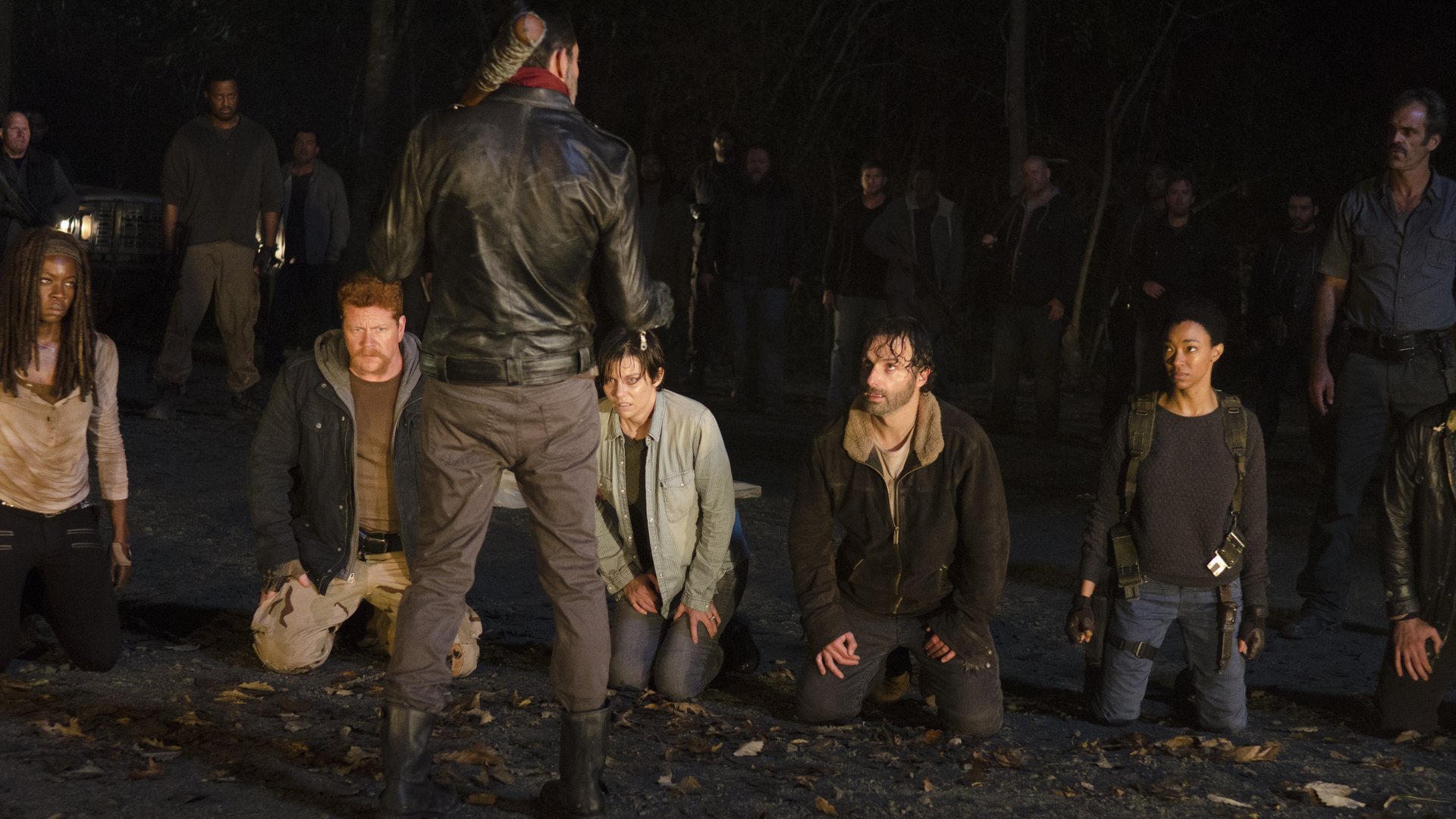A completely asinine cliffhanger on “The Walking Dead” has fans in an uproar
I stopped watching AMC’s The Walking Dead two seasons ago. I immensely enjoyed the show’s first season, then slogged through the next three, before finally calling it quits early in its fifth season. I never wholly disliked the show—I just got bored by it. Still, I always assumed I’d pick it back up again, perhaps during a week-long summer binge session.


I stopped watching AMC’s The Walking Dead two seasons ago. I immensely enjoyed the show’s first season, then slogged through the next three, before finally calling it quits early in its fifth season. I never wholly disliked the show—I just got bored by it. Still, I always assumed I’d pick it back up again, perhaps during a week-long summer binge session.
That seems rather unlikely now. Last night (April 3), the hugely popular zombie show’s season six finale aired, and the consensus among both fans and critics is that it was terrible.
The ire focused on a cliffhanger in the final scene, in which a newly introduced villain kills one of the show’s beloved heroes—but the audience isn’t shown which one. To find out, they’ll have to tune in for the seventh season, to air this fall, only on AMC.
HitFix critic Alan Sepinwall called the cliffhanger “hilariously stupid” and announced he is done reviewing the show. Vox critic Todd VanDerWerff said the episode was the show’s worst one ever, and that it insulted fans. The Atlantic’s David Sims was similarly vexed. Melissa Leon of The Daily Beast called it “trolltastic.”
And the fans were even more unforgiving. One of the top posts on Reddit this morning, entitled “Fuck you TWD,” is filled with nearly 2,000 comments by fans commiserating over feeling cheated by the show. The same sentiment pervades even The Walking Dead‘s own subreddit, which is populated by the show’s most diehard fans. A post about the finale is inundated with angry f-bombs. Countless fans vowed to stop watching the show.
One need only glance at the replies to this tweet from the show’s official Twitter account to get a sense of how slighted the fans feel:
It might seem strange for a show to acknowledge that an episode will likely upset fans. And indeed, this is the type of shameless storytelling tactic that could kill a lesser show. But this is The Walking Dead—the most popular cable TV series in the world, and one whose ratings have stayed monstrously huge despite angering fans a number of times in the past.
Last night’s finale was no doubt the show’s most egregious affront to its fans yet, but there’s little reason to expect fans to abandon the show in droves. Fans of The Walking Dead have become the real walking dead—mindlessly watching, even when some primal instinct within them is saying that the show is crap.
What may change, though, is how the show is written. AMC, the prestigious network responsible for Breaking Bad and Mad Men, knows it can’t keep gambling with audience expectations, even if ratings continue to impress. In this social-media-focused age, AMC doesn’t control the show, the fans and critics do. The Walking Dead belongs to geek culture now, and the network would be wise to listen to what its denizens are saying about the show’s storytelling mechanics.
The reason I stopped watching the show wasn’t because of dumb cliffhangers. It was because the plot was awfully meandering, circling back again and again to the same story lines, the same moral dilemmas, the same hokey zombie fights. The writers might be able to promise fans to never include another asinine cliffhanger again, but they can’t promise me that they’ll suddenly come up with a new way to move the story forward.
Showrunner Scott Gimple compared the cliffhanger to a moment on the popular ABC series Lost. (At the end of its first season, the characters finally open a mysterious hatch in the ground, but the audience doesn’t see what’s in it.) But that comparison misses two important points: First, Lost, a mystery show, was predicated on those types of cliffhangers. Second, the show had earned that moment through a season of compelling storytelling. By all accounts, The Walking Dead‘s cliffhanger wasn’t earned—it was thrown in solely to keep fans rabid while the show is off the air.
Lost had its fair share of silly moments, but at least it knew when to end. Its ratings were fantastic—it could have easily gone on for another season or two or ten, but the writers had told the story they wanted to tell. The arc was finished.
The Walking Dead, meanwhile, has no end in sight (and, arguably, no arc at all). Most likely, it will limp on indefinitely, until the viewers find there’s no more flesh left to feast on, and are left to pick at its bones.